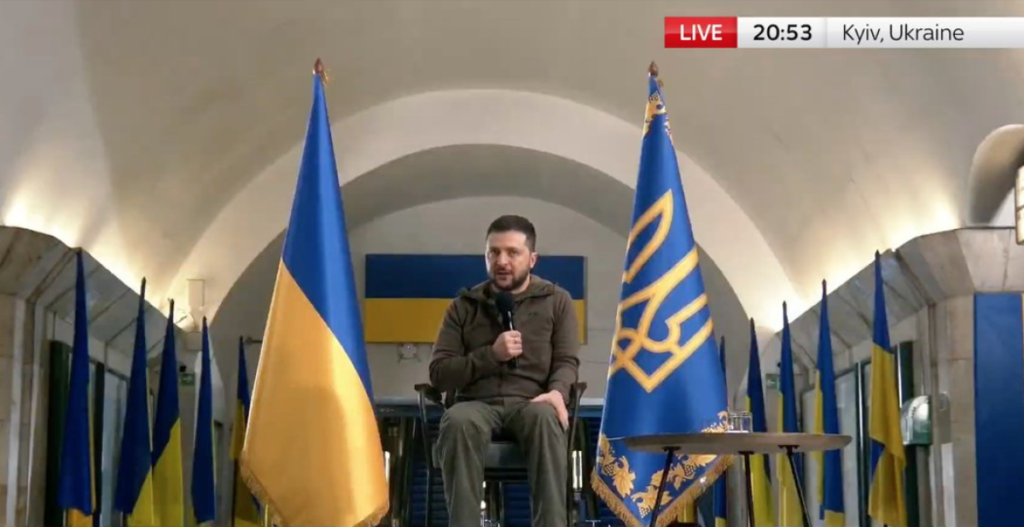
By Branko Marcetic, Jacobin, 1/29/23
As unbelievable as it might sound, the invasion under which millions of Ukrainians are suffering right now will likely not be the end of their hardship. That’s because of the hand-rubbing that’s been happening the past few months over the potential business bonanza to be found in the country’s postwar reconstruction.
In November last year, Ukrainian president Volodymyr Zelensky signed a memorandum of understanding with BlackRock that will see the firm’s Financial Markets Advisory (FMA) — a special consulting unit set up after the 2008 crash to work with crisis-stricken governments — advise Ukraine’s economic ministry on designing a road map for rebuilding the war-torn country. In BlackRock’s words, the agreement has the “goal of creating opportunities for both public and private investors to participate in the future reconstruction and recovery of the Ukrainian economy.”
Ukrainian officials have been more blunt, with the ministry’s press release saying it would “primarily attract private capital.” The agreement formalizes a set of September 2022 talks between Zelensky and BlackRock chair and CEO Larry Fink, in which the president stressed that Ukraine must “be an attractive country for investors” and that it was “important to me that a structure like this be successful for all parties involved.” According to a release from the president’s office, BlackRock had already been advising the Ukrainian government “for several months” by the end of 2022. The two had agreed to focus on “coordinating the efforts of all potential investors and participants” in Ukrainian reconstruction, and “channeling investment into the most relevant and impactful sectors of the Ukrainian economy.”
The history of BlackRock FMA makes all of this particularly foreboding. According to an Investigate Europe dive into its activities in Europe, BlackRock is “an adviser to states on privatization” and “is very busy countering any attempt to increase regulation” in Europe. The firm used the 2008 financial crash — built on the risky mortgage securities Fink himself had pioneered — to increase its power and sway among political decision-makers, leaving a trail of conflicts of interest and revolving-door influence-peddling in its wake. In the United States, it’s been particularly controversial for running the Federal Reserve’s pandemic-era bond-buying program, nearly half of which ended up making purchases in BlackRock’s own funds.
Ukraine is already opening up for investment. In December last year, as Kiev and BlackRock were months into their discussions, the Ukrainian parliament rammed through property developer–backed legislation that had stalled prior to the war, deregulating urban planning laws to the benefit of a private sector that has been hungrily eyeing the demolition of historic sites. It comes on top of parliament’s earlier assault on the country’s Soviet-era labor laws, legalizing zero-hour contracts, weakening the power of unions, and stripping labor protections from 70 percent of its workforce. That particular change was advised not by BlackRock, but the British foreign office under Boris Johnson, and pushed by Zelensky’s party, which charged that the “extreme over-regulation of employment contradicts the principles of market self-regulation” and “creates bureaucratic barriers . . . for the self-realization of employees.”
“Steps towards deregulation and the simplification of the tax system are examples of measures which not only withstood the blow of the war but have been accelerated by it,” the Economist gushed in its 2022 Reform Tracker for the country. “With both domestic and international audiences committed to Ukraine’s recovery and development,” reforms were likely to accelerate after the war, it hoped, anticipating added deregulation, further “opening the path for international capital to flow into Ukrainian agriculture.” The recipe for success, it counseled, required more privatization of “loss-making state-owned enterprises,” which will “depress government expenditure.” This last goal of privatization, the Economist bitterly noted, had “stalled as the war broke out.”
Yet the Economist needn’t have worried, because this was one of the top priorities for postwar Ukraine, as mandated by the European backers currently propping up the country’s economy and pledging to rebuild it. This past July saw a host of big business, European, and Ukrainian representatives attend the Ukraine Recovery Conference, 2022’s version of the annual Ukraine Reform Conference, which had measured the country’s progress on the neoliberal pathway its post-2014 integration with the West demanded.
As the conference’s policy brief on economic recovery made clear, a postwar Ukrainian state won’t need BlackRock around to pursue the kind of agenda a Republican politician dreams of. Among the policy recommendations are a “decrease in government spending,” “tax system efficiency,” and “deregulation.” It advises further “reducing the size of government” through privatization and other reforms, liberalizing capital markets, and ensuring “investment freedom” — a euphemism for opening up markets — thereby creating a “better and more familiar investment climate for EU and global direct investment.”
The vision discussed by attendees is something straight out of Pete Buttigieg’s wildest fantasies: the country as start-up, one that’s digitized, business-friendly, and green, albeit with nine nuclear reactors built and supplied by the US-based Westinghouse. It’s a model that ramps up Zelensky’s own “country in a smartphone” vision he put forward three years ago.
This is a familiar story when it comes to crisis-riven nations that come to rely on the financial aid of Western governments and institutions, who often find that the funds they desperately need come with some unsavory strings attached. These come in the form of mandatory reforms that dismantle state involvement in the economy and open up the country’s markets to foreign capital, adding to its people’s impoverishment and suffering. This was happening in Ukraine long before the invasion, with the International Monetary Fund and Western officials like then US vice president Joe Biden pressuring the government to carry out reforms like cutting gas subsidies to Ukrainian households, privatizing thousands of state-owned companies, and lifting the long-standing moratorium on selling farmland. Zelensky saw this last item through under pandemic-driven financial pressures.
Ukrainians’ freedom to determine their own fate has been under assault from Moscow’s colonial-style land grab. Unfortunately, it looks likely that an end to the war will bring new assaults from the other direction as the West’s army of investors readies its invasion.

